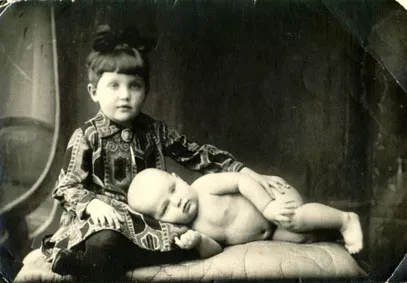Irina Lopko with her brother Yefim Mindel
This is me and my younger brother Yefim, I am wearing a brooch with my father's portrait. This photo was made in Nezhin in 1936.
My brother Yefim was born in 1936. I remember sitting on my mother's lap and she had such a big belly and there was something stirring inside. Then this crying and screaming nubbin came into the world. He was big and beautiful. Eight days later my brother was circumcised. I remember this well. The baby was whining there were old people around him doing something to him and I was very worried and horrified thinking that they might harm this little baby and they were trying to calm me down.
My brother Yefim was born in 1936. My mother went to work two months after Yefim was born. She was a highly qualified accountant. She worked all her life. We always had housemaids before the war. My mother worked a lot as deputy chief accountant of the municipal trade department. This was a very important position. In late 1930 my father also changed his job. I liked the horse smell in our house, but my mother rebelled against his profession. However, my father adored horses and went to work as horse dealer at a military registry office. My father was responsible for providing horses for the needs of the army and he often went on business trips. Every spring he went to military camps where he stayed through summer.
My grandfather and grandmother Mindel only spoke Yiddish. I visited them for a cup of tea after kindergarten every day and they spoke Yiddish in my presence and once my grandmother commented 'I think she understands' and I nodded my head 'Yes, yes, I understand'. Then my grandmother and grandfather began to speak Yiddish to me and I enjoyed talking with them in Yiddish. There we sat at the table having tea and jam, my grandfather on my right and my grandmother on my left quietly talking in Yiddish. My grandfather taught me everything Jewish I know: Jewish songs, traditions, dishes, Jewish warmth and Jewish soul. Matzah was made in his home and Jews got together to pray in his home when there were no synagogues left in the town after the Great Patriotic War as a result of titanic efforts of the Soviet regime.
I went to school in 1939. There were no Jewish schools left in Nezhin by then and I went to a Russian school. My mother always wanted to give me good education. I studied German with a governess and had music classes at home. My grandmother and grandfather taught me Yiddish. I did very well at school. I had all excellent marks and I and my friend Yasha, a Jewish boy, were the best in our class. There were many Jewish children in my class. I was a very quiet child. My first teacher who also knew my mother since grammar school used to say 'Why doesn't she speak louder? How will she live?'















